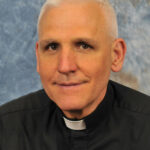By Barb Arland-Fye
The Catholic Messenger
DAVENPORT — Father Theodore Hesburgh’s pivotal role as principle architect of the Civil Rights Act serves as the centerpiece of a documentary that demonstrates the need to build relationships between people on opposite sides of an issue.
The life of this priest, the well-known leader of the University of Notre Dame for 35 years (1952-1987) who invested his heart and soul in the church he loved, the people he served and the principles of Catholic Social Teaching, provides a template for our times.
His story comes to life in “Hesburgh,” which 60 leaders from a variety of Quad-City area organizations viewed Oct. 10 at St. Ambrose University’s Galvin Fine Arts Center.
The Notre Dame Club of the Quad Cities and St. Ambrose University sponsored the event.
“Our hope is to provide inspiration to the leaders and teachers who are in many ways responsible for shaping the minds and policies around societal change within the Quad Cities community,” said Kelly Bush, a Notre Dame Club board member.
“While admired by many, Fr. Hesburgh was no stranger to controversy. As you’ll see in the film, he upsets all sides of the aisle at some points. All of these things are worthy of exploration in further discussions as hindsight tends to be 20/20,” Kelly, a University of Notre Dame grad, told the audience.
As a member of the nation’s Civil Rights Commission at its founding in 1957, Fr. Hesburgh persevered in bringing opposing sides together to craft the Civil Rights Act. Evidence of his relationship-building skills appear in film footage that shows the Civil Rights Commissioners fishing, eating and relaxing in Land O’ Lakes at Notre Dame’s research site in Wisconsin.
The bonding experience in a retreat-like setting provided the inspiration for the commission to vote unanimously on 11 of 12 Civil Rights recommendations to submit to Congress. Although President Nixon appointed Fr. Hesburgh to chair the commission, he left in 1972 because of his criticism of the Nixon Administration’s civil rights record (hesburgh.nd.edu/fr-teds-life/champion-of-civil-rights/).
Fr. Hesburgh’s decision to resign that leadership position for reasons based on principles impressed Larry Roberson, president of the Metrocom NAACP of Davenport, who attended the “Hesburgh” screening at St. Ambrose. “The priest was absolutely awesome. I couldn’t believe all of the things he was involved in. He was about doing the right thing … I hope a lot of other people will come out to see it. In my mind it’s an absolute must-see.”
He hopes a younger crowd will attend the next showing of “Hesburgh” Jan. 18 and 19 at St. Ambrose University to kick off Civil Rights Week. “They are the next generation and to see how he lived and built his life in service to humankind, that might inspire them. You don’t necessarily have to be a priest to be about service.”
“Father Hesburgh is an inspiration for us all. He was a role model for living a life in which one ‘walks the talk,’” said Rabbi Henry Karp, emeritus of Davenport, who attended the screening with his wife, Cantor Gail Karp, emerita. “He did not just preach and teach the values of his faith. He married his values to his actions. For him justice was more than just a word in Scriptures,” Rabbi Karp said. “It was a command from God which he must fulfill.
As he looked around the room, the rabbi knew that people would be moved by Fr. Hesburgh’s story, but wondered “how many would actually be moved to action, to commit themselves to actively work for justice as well as favor it in their thoughts and in their hearts. Fr. Hesburgh would have been the first to remind them of the words of Deuteronomy – ‘Justice, Justice shall you pursue!’”
Norm Bower, Notre Dame Class of ’75, appreciated that “the film showed Father Hesburgh’s devotion to his family and the priesthood, along with his impressive contribution to the national dialogue about race relations in a turbulent time. My time at ND included the start of co-education and the end of the Vietnam war, so tension, change and progress were constants. Proud to have his signature on my diploma.”
Tim Chen, president of the Notre Dame Club of the Quad Cities, said he’s seen the documentary four times. “I was amazed by Fr. Ted’s ability to bring people with opposing viewpoints together and find common ground to move causes forward and do so with civility, kindness and love.”
Chen was also “struck by how much this ability is lacking in leadership today at all levels and on both sides of the aisle. We’re too focused on our differences and being outraged rather than giving each other the benefit of the doubt, focusing on a ‘win-win.’”
“As a student when Fr. Ted was the president, I knew he was an important and respected dude, but I didn’t realize I was in the presence of such monumental greatness.”
Bishop Thomas Zinkula gave the opening prayer at the screening, which reflected on the legacy of Fr. Hesburgh as servant leader and bridge builder. He prayed:
“Like Fr. Hesburgh, give us the courage to respond to a higher love, one that reaches across the ideological divide and finds common ground. Soften our hearts so that we are moved to develop relationships and interact with those who don’t see things the way we do. In imitation of Fr Hesburgh, open our eyes to see what unites people rather than what divides us. Instead of building walls that isolate us from others, show us how to build bridges that bring people together.”
Documentary breakout
What: “Hesburgh,” a feature-length documentary film about the late Father Theodore Hesburgh, who served as president of the University of Notre Dame from 1952-1987.
He also served on the federal Civil Rights Commission from its foundation in 1957 until his resignation in 1972.
Director: Patrick Creadon
Producers: Christine O’Malley, Jerry Barca
Editors: Nick Andert, William Neal.
Music: composed by Alex Mansour
Run time: 104 minutes
Next viewing: Jan. 18 and 19 at 3 p.m. both days, St. Ambrose University in Davenport. Donation suggested for scholarship fund.











